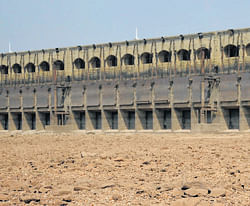
The entire agro-climatic condition in the Cauvery basin area covering seven districts of Karnataka is likely to undergo a change if the contentious final award of the Cauvery River Water Disputes Tribunal (CRDT) is implemented in toto.
It is feared that the command areas under key irrigation projects of KRS, Kabini, Hemavathi and Harangi reservoirs would shrink drastically, forcing the farmers, especially those in tail-end areas, to go in for a change in crop pattern. For, the quantum of water allocated by the Tribunal to each of the major projects is far below the existing irrigation potential.
| Due drops Water allocation to key irrigation projects: - KRS: 38.98 tmc ft - Kabini: 11.99 tmc ft - Harangi: 8.6 tmc ft - Hemavathi: 43.67 tmc ft - MI projects: 63.83 tmc ft - Anecut canals: 38 tmc ft - Devaraj Urs canal: 5.92 tmc ft - Yagachi: 3.35 tmc ft |
The Centre, which notified the final award of the Tribunal, will soon set up Cauvery Management Board (CMB), which will take steps to implement the final ward. The Tribunal has not only allocated the river water among the riparian states, but fixed the quantum of water to be utilised for specific purposes by each state in their share. The final award will come into effect 90 days after its notification.
“The agro-climatic condition in the river basin will turn upside down. The Tribunal award will not only change the crop pattern but the way river flows in the basin areas.
Moreover, there is fixed allocation of water under each of the irrigation projects.
Karnataka’s job will be confined to only storing and releasing water to Tamil Nadu throughout the year if the final award is implemented,” Irrigation expert Capt Raja Rao said.
Worst affected will be sugarcane and paddy crops. Mandya district will lose its distinction as the sugar bowl of Karnataka. For, sugarcane crop is allowed to be grown in only 40,000 acres in the KRS command area as per the Tribunal award, he added.
Paddy to reduce by 25 pc
The CRDT has fixed 1.15 lakh acres for paddy and 20,000 acres for semi-dry crops under the KRS irrigation project area, wherein only 38.98 tmc ft of water is allowed to be utilised in a year.
Going by the allocation, the existing KRS command area would shrink by about 25 per cent, official sources in the State Water Resources department said.
The Kabini command area would contract by nearly 50 per cent. Karnataka can utilise 11.99 tmc ft of water annually under the Kabini project and the Tribunal has fixed 1.30 lakh acres for agriculture operation, including 33,000 acres for paddy and 40,000 acres for semi-dry crops.
The Kabini command area actually covers about 2.5 lakh acres. Same will be the scene in Hemavati and Harangi project areas, which have been allocated 43.67 tmc ft and 8.6 tmc ft water respectively. The total crop areas fixed for Karnataka is 18 lakh acres.
Besides, the officials said the way water is allocated to each irrigation project is unscientific.
For instance, about 63.83 tmc ft and 38 tmc ft are allocated for minor irrigation (MI) projects and anecut canals. But the reality is that most of the MI projects have become redundant and hence, the allocated water remains unutilised.
Currently, there is no restriction on utilising water for specific projects. If the CMB insists on following project-wise allocation, the State will not be able to utilise its complete share of 270 tmc ft, officials explained.
No immediate impact on B’lore
According to irrigation experts, there will not be any immediate impact on drinking water needs of Bangalore city if the Cauvery River Water Disputes Tribunal (CRDT) award is implemented.
For, the Tribunal has allowed diversion of up to 20 per cent water meant for irrigation purpose for drinking water purpose.
It is over and above the allocation of 1.8 tmc ft for drinking water and 17.64 tmc ft extra allocation (which can be used for drinking purpose).
“Though two-third of Bangalore lies outside the Cauvery basin area, I do not think there will be any restriction on drinking water. The State has the right to utilise its share of water,” Irrigation expert Capt Raja Rao said.